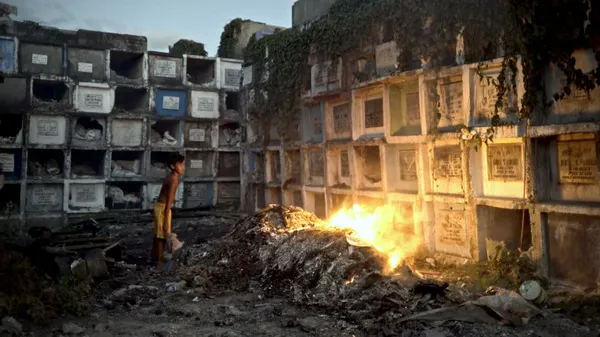Eye For Film >> Movies >> Aswang (2019) Film Review
Aswang
Reviewed by: Amber Wilkinson

The grim and heartbreaking reality for many in Manila is brought home by Alyx Ayn Arumpac's debut feature - which gets down to street level to observe the devastating effects of Filipino president Rodrigo Duterte's "war on drugs". This is a conflict that, it seems, is disturbingly selective, with the poor falling casualty at an alarming rate while the drug lords themselves continue untouched. The director frames her gritty footage with the story of the aswang of the title - a mythical shapeshifter said to prey on humans and kill anyone who looks back at them and a name that we're told is invoked when people mean: "Be afraid." There's a melancholic poetry to the sparing voice-over that returns to the concept of the aswang that helps to frame the more brutal footage contained in Arumpac's film.
The idea of being killed by something you were brave enough to look in the eye carries with it an idea of contradiction - something else that seems evident in a country where 85 per cent of the populace apparently back the anti-drug campaign despite the death toll of approximately 1,000 a month it seems to bring with it. One man sums up the apparent disconnect when, as he considers the murder of his brother - one of the many victims of "extrajudicial killings" - he says, "I'm for Duterte, but what they did to my brother was wrong".

Arumpac shows the scale of the death rate in scenes shot in a funeral parlour, where the undertaker explains that they keep the bodies for three months in case a relative shows up before opting for mass burial. Most poignantly, she follows a youngster, Jomari. A kid of no more than about seven years old, he describes one of the teenagers killed in the violence, Kian Lloyd delos Santos, as "my only friend in the world". He's a vital and streetwise young soul but his assessment doesn't seem far wrong, with both his addict mother and father in jail. As is so often the case with documentaries, children bring home the truth of the situation - we only need to see them playing at being "police" to know exactly what the concept means to the people of Manila and it isn't law and order.
Jomari becomes a focal point for our concerns as the film progresses, as we increasingly fear for his welfare, although the fact that we see him interacting with the director early on as she buys him a new pair of flip-flops clues us in to the fact that there is cause for optimism. Elsewhere, Arumpac builds a tapestry of trauma and injustice as we see relatives grieving and learn how police corruption also extends to kidnap and extortion. This feels somewhat episodic in places but a strong edit from Fatima Bianchi and Anne Fabini coupled with the voice-over framing device help to hold it together. Shot mainly at night, the darkness deepens the film's oppressive quality, while the constant presence of rubbish only adds to the sense of everyone sitting in a miasma of despair. This is a cri de coeur of a documentary - not looking for answers from authorities, quite possibly because none would be forthcoming, but asking instead that those watching the film look reality directly in the eye and live to tell the tale.
Reviewed on: 19 Jun 2020
















